Active listening, respect, and the ability to negotiate are indispensable skills for aspiring science diplomats. And at the 11th annual AAAS-TWAS Course on Science Diplomacy, 20 participants from around the world were exposed to role-playing simulations to train these skills.
The course, co-organized with its historical partner the American Association for the Advancement of Science (AAAS), took place 18–20 June 2024, in Trieste, Italy. The participants worked in pairs—a scientist and a policymaker, usually from the same country, who had to pursue their joint goals during breakout sessions. Each breakout session was assigned a complex problem to solve using diplomacy. Through this exercise, the trainees saw first-hand the complexities of how science can serve diplomacy, and play a pivotal role in orienting political decisions.
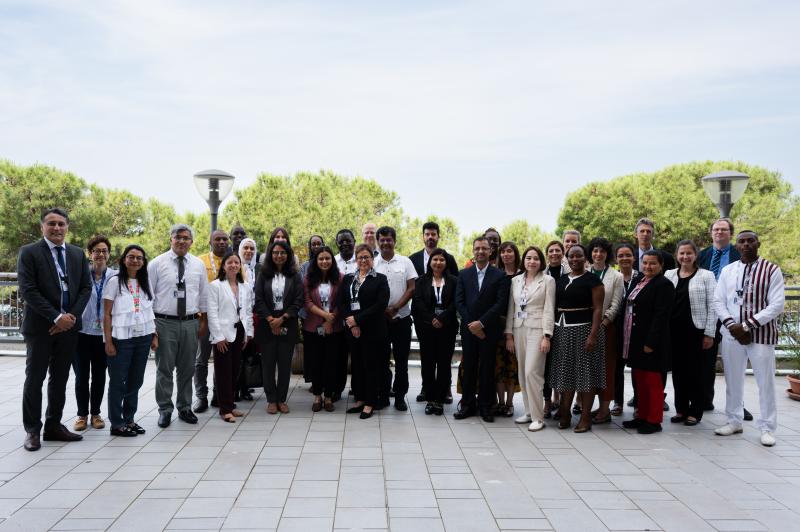
The collaboration between AAAS and TWAS started in 2011, when the parties agreed on establishing science diplomacy courses that TWAS would host. Since its inception, in 2014, the programme has trained 388 alumni from 89 countries, some of whom have since advised policy makers and governments on transboundary issues.
The course receives financial support from the Swedish International Development Cooperation Agency (Sida), and AAAS. This year, additional funds came also from the Organization for Women in Science for the Developing World (OWSD).
Crisis on a transboundary river
The world is home to more than 270 transboundary river basins, serving three billion people in 145 countries, according to the Capacity for Disaster Reduction Initiative (CADRI), a partnership that includes 20 international organizations, including UNESCO. Therefore, failure to cooperate in sharing water may have a severe impact on millions of lives. When several countries share a river, that means they share a useful natural resource, and so conflicts about who can use that resource—and how—may emerge.
States must seek avenues to cooperate despite these conflicts, so as to provide fair sharing of hydropower production, as well as water for irrigation, industry, drinking, and household supply. This was the focus of one of the breakout sessions, in which attendees from Argentina, Cameroon, Germany, Kazakhstan, Madagascar, and Uganda, had to negotiate the fate of a fictional transboundary river.
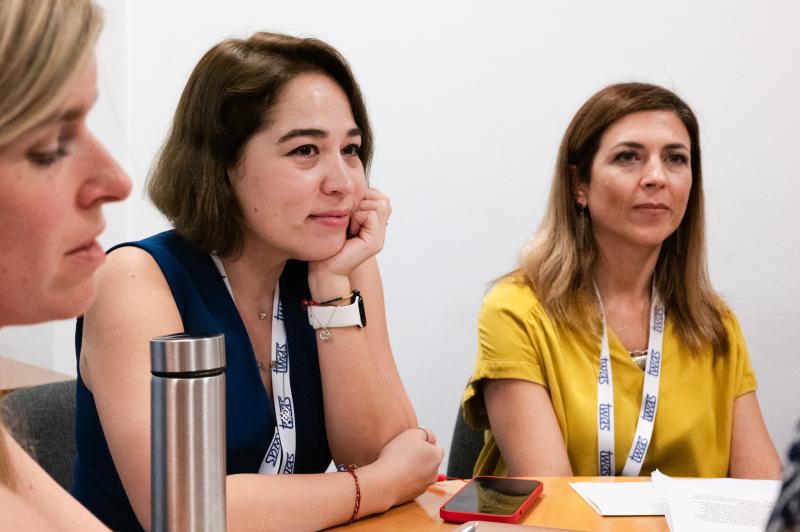
For the breakout groups, AAAS and TWAS devised two fictional scenarios in a way that they would expose the participants to the most common challenges that diplomats come across in real situations.
The first scenario involved an imaginary river flowing through eight countries, with three developing countries (Country X, Y, and Z) engaged in a dispute. The most upstream Country, X, wanted to build a dam to generate electricity for export. Downstream Countries Y and Z feared that a dam would cause water shortages, economic slowdown, and unemployment. To throw further coals on the fire, there was an old historical agreement between Countries Y and Z, which does not include X, pitting the two downstream Countries against Country X.
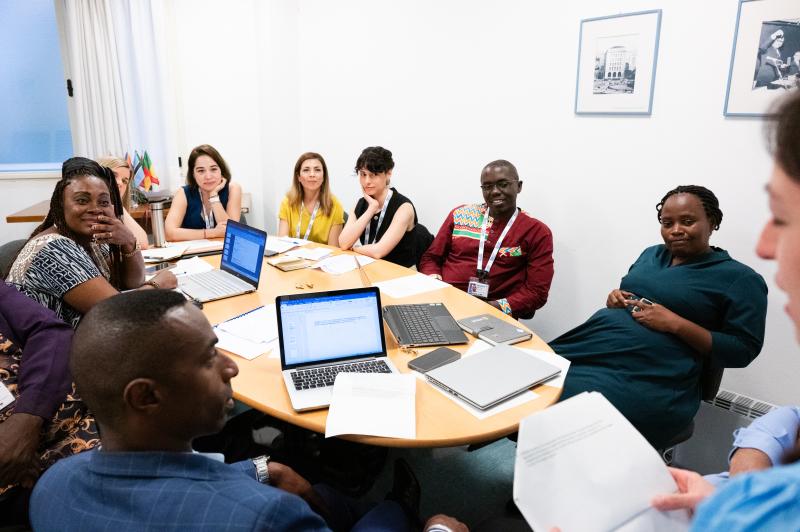
Around the table were representatives of the three Countries: Ministers of Foreign Affairs, Ministers of Water and Energy, of Science, Technology and Innovation, and of Agriculture and Irrigation. Two representatives each for a Continental Union and a Centre for Human Rights and Peace Studies were also in the discussion, to represent the role international organizations play in negotiations over natural resources.
Nassiba Baimatova, an environmental scientist from Kazakhstan, played the role of Minister of Foreign Affairs of Country X. Initial discussions were quite challenging, she reported. Baimatova and her diplomat partner, Elisabeth Deus of Germany, who played the Minister of Water and Energy, had all the parties against them. So, keeping neutral, respectful behaviour was not always easy.
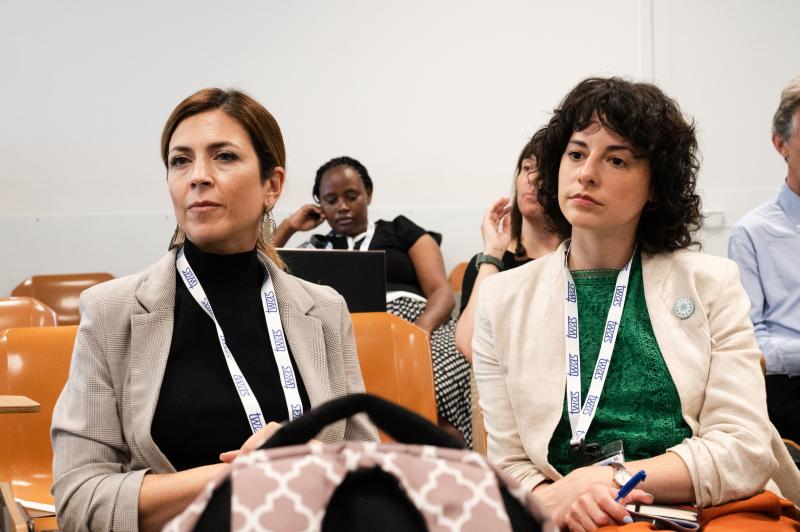
"At the beginning, I was strongly making the case of Country X because the area bound to build the dam was on our territory, upstream of other two countries," Baimatova said. "Then I realised that, to be successful, a diplomat should be, or at least sound, impartial. So, I changed my approach, trying to look less uptight."
Marianela Rodriguez, a plant biologist from Argentina acted as the Minister of Foreign Affairs of Country Z. Her approach was quite formal, initially. With her Argentinian colleague Malen Vazquez, who acted as Minister of Agriculture and Irrigation, she highlighted the devastating impact that a dam would have on the population of her country. However, upon realizing that her arguments were not taken in due consideration, her approach changed.
"During the discussions, my partner and I realized that our perspectives were distant and complementary. Still, they were equally important. That's why we joined forces, to make our argument stronger, merging the perspective of a scientist and the view of a diplomat," Rodriguez said.
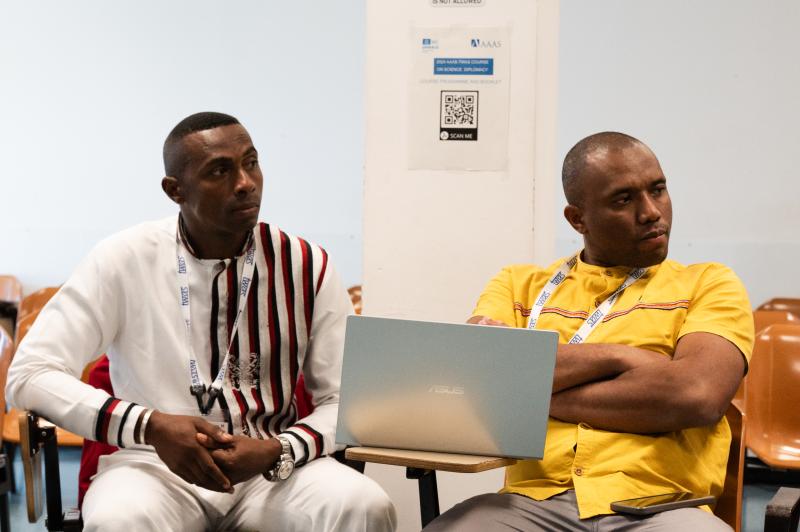
Stepping into simulated roles turned the participants into good actors who made the discussion quite intense, at times. After refusing for a while any negotiation, chemist Rija Razafintsalama and diplomat Dahy Ioclin of Madagascar—who represented Country Y—decided to open up. They agreed to allow the dam construction providing that their own country would receive free electricity in exchange. Quite predictably, their decision fuelled new discussions in the group.
Facing sudden changes of perspectives from the parties was good training for the participants, who reported learning how to practice active listening and transparent negotiations. Representatives of the Continental Union—Cameroonian chemist Linda Mbong and diplomat Peter Ndifon—played the peacemakers, trying to bring the group to greater wisdom.
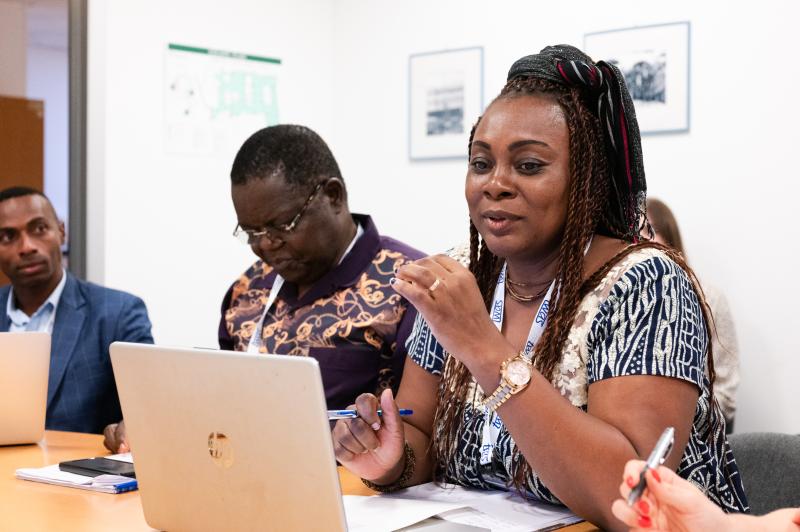
"Initial discussions focused too much on local aspects, overriding issues of public interest," Mbong noted. "That's why I tried to refocus the group attention on the importance of involving in any decision all eight countries crossed by the River, and also considering the role of the international community in facilitating and supporting transboundary water management negotiations."
Balancing the right of countries to harness their water resources and the need to grow their economies was a difficult exercise. However, as Razafintsalama noted, interacting with a new group was an enriching experience. "We welcomed new ideas and learned from other people," he said.
Watch the video 'Science for Diplomacy: Collaboration in times of diplomatic tension' with an interview with James Hammond, a professor of Geophysics at Birkbeck, University of London (UK), who was among the speakers of the 11th AAAS-TWAS Course on Science Diplomacy.
Preventing poaching of endangered species
The second group was asked to discuss the illegal trafficking of pangolin scales across the borders of Countries A and B, which shared a rainforest where pangolins live. However, each country had a different approach to forest management and development.
Close by there was Country C, offering to support a multi-million USD scientific project for sustainable development. A few kilometres away lay Country D, a landlocked state bordering A and B, hosting top-ranking scientific hubs with modern laboratories, and receiving financial support from the Convention on International Trade in Endangered Species of Wild Fauna and Flora (CITES).
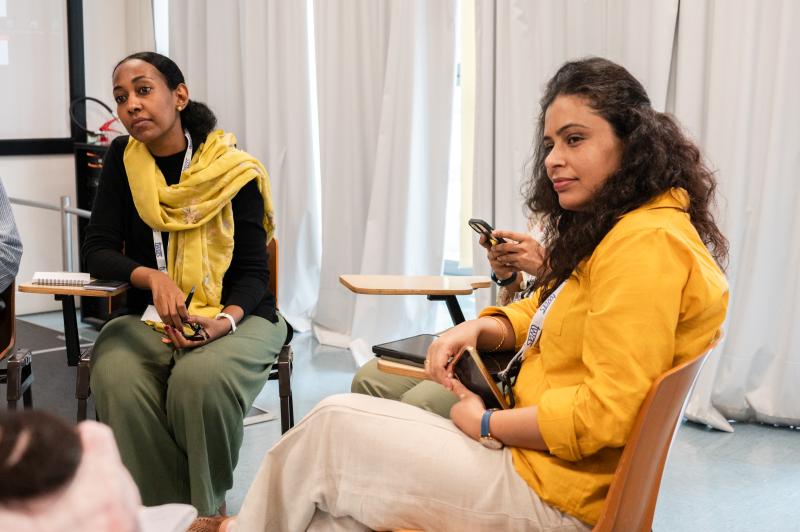
The whole dispute had to do with biodiversity loss and its wider implications. According to an Intergovernmental Science-Policy Platform on Biodiversity and Ecosystem Services assessment, almost one million species are at risk of extinction, and developing countries in particular would pay the price for this situation. Disrupting one ecological niche, in fact, can impact others, in a ripple effect that developing countries, in particular, may not have the resources to curb.
Ten participants from Guatemala, India, Nepal, Pakistan, and Sudan challenged their diplomatic skills settling a dispute between these four neighbouring developing countries.
CITES informs that pangolins are among the most illegally traded animals. People in some countries (including Country C in this simulation) believe their scales have medicinal properties.
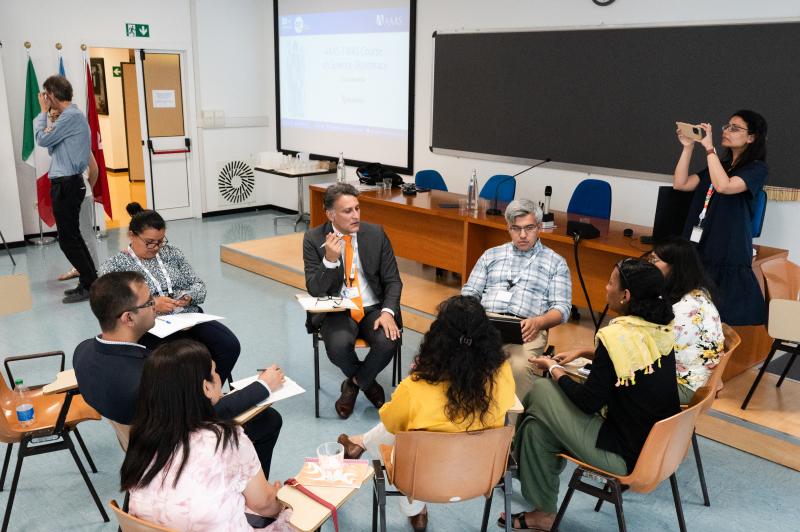
Among the issues that the participants had to examine were: How could they fairly address the suspicion that Country B is involved in the illegal trade of pangolin scales? What were the cross-border collaboration mechanisms needed to meet all the countries' needs? How could they create a win-win situation with so many opposing views?
"I soon realized that I had to build trust among the participants who did not share the same views and principles. Personally, I successfully built highly engaging and dynamic interactions with many of them," said Nidhi Singh of India, who represented Country C as a scientific attaché to Countries A and B. The role-playing exercise, she said, added depth to the discussions, making the entire process insightful. "By learning to opt for productive discussions, the whole group managed to agree on several aspects, in a cooperative atmosphere."
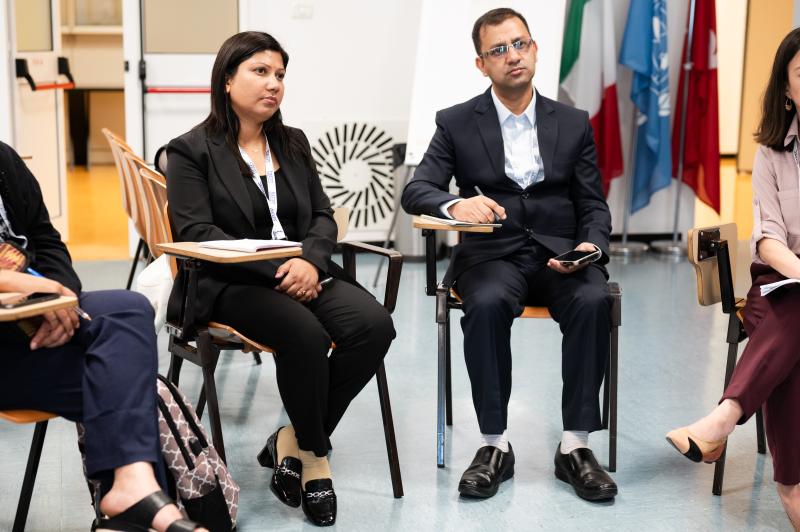
Rather than pursuing individual goals, soon the participants looked for common ground. They all agreed to create a regional task force to coordinate the conflicting needs of each country, and acknowledged the importance of coming to terms to fight pangolin trafficking and preserve biodiversity.
Nepalese microbiologist Supriya Sharma, who acted as a biotech expert and Head of the National Biotech Laboratory of Country D, said: "This role closely matched my real-life profession, making this experience particularly meaningful and resonant. I saw the impact that scientists can have in evidence-based decision-making processes and how they can be game-changers in the society—if they effectively communicate with policy makers."
The experience was equally meaningful for her pair-mate Shreedhar Aryal, a senior consultant surgeon at Hetauda Hospital in Nepal, who played the regional director of CITES. "I had to bring all the countries around a table to find a common agreement regarding the illegal trafficking of wild animals. It was indeed a tough job to get consensus," he said.
Challenging as it was, he added, interacting with so many conflicting parties spurred him to use resources that he was unaware he had. "Nobody was willing to accept negotiation. Everybody was fighting for his or her own cause, denying any illegal activities and expecting their petition to be the most important."
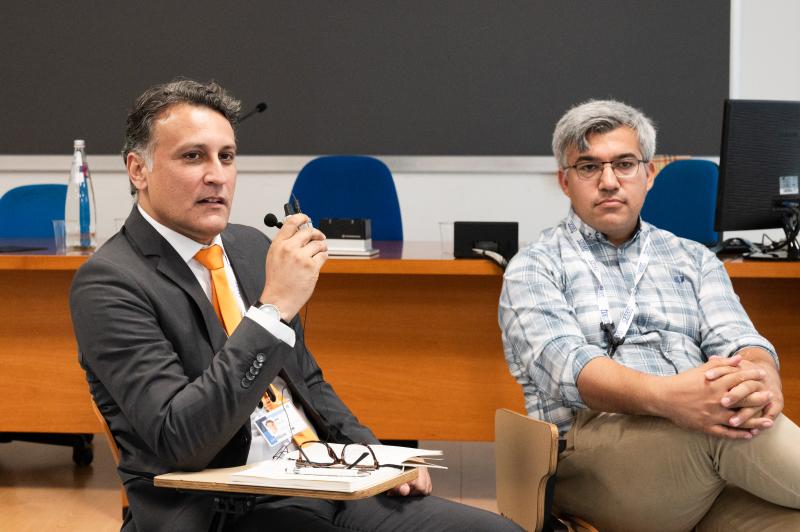
Eventually, Aryal found a way out. He convinced the parties to abandon illegal trafficking by offering funds to reconvert unlawful activities into legal trades, which could promote growth and economic development. "Finding a win-win solution for many participants reduced tension and was an important lesson I bring with me after the course," he said.
His proposal was strongly supported by the Minister of Finance of Country C and the representative of the regional development bank. They both agreed to involve a broader audience, and make the population aware of the the importance of biodiversity.
Ecotourism, they explained to the group, is a sustainable way to preserve pangolins because the community will benefit economically from the well-being of these animals. Living pangolins will generate more income and return on investment than their scales. Habib Jan, a molecular biology and genomics professor from Pakistan who played the Minister of Foreign Affairs of Country B, echoed this final consideration saying: "We are ready to do anything that can help us in the anti-poaching drive."
More pictures from the 2024 AAAS-TWAS Course on Science Diplomacy are available on the TWAS Flickr pages.
Cristina Serra

